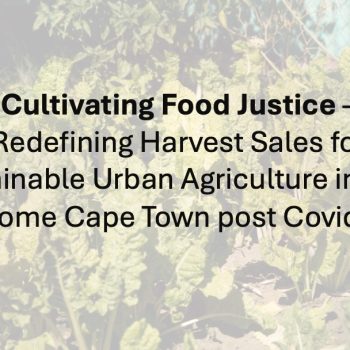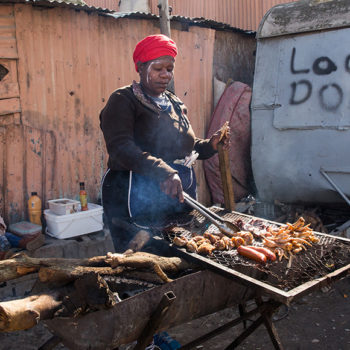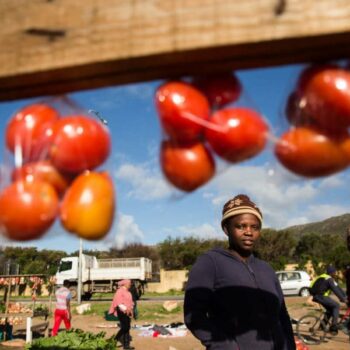
Caroline Skinner
ACC Senior Researcher | WIEGO Director of Urban Research
caroline.skinner@uct.ac.za https://www.wiego.org/Projects
Bio
Caroline Skinner is a Senior Researcher at the African Centre for Cities and Urban Policies Programme Director for the global network Women in Informal Employment: Globalizing and Organizing (WIEGO). For over two decades, Caroline’s work has interrogated the nature of the informal economy and processes of informality. She seeks to generate new knowledge, inform livelihood-centred policy and planning responses, and better equip current and future urban practitioners to engage with ‘informality’. A key focus is providing technical support to both international and local worker movements.
She has been involved in all three of WIEGO’s multi-city, panel studies monitoring the impact of crises on informal workers in cities across the Global South – first during the 2008/9 Global Financial Crisis that developed into the 10 city Informal Economy Monitoring Study and more recently the 12 city Covid-19 Crisis Study. An abiding interest has been analysing South African Labour Force Survey data – monitoring trends over time in employment in the informal economy. Relatedly, she co-convened the informal sector group within the Employment, Income Distribution and Inclusive Growth project based in the Economics Department at UCT. This resulted in the edited volume The South African Informal Sector: Creating Jobs, Reducing Poverty. These elements of her work aim, in part, to speak back to debates in economics.
Caroline has long monitored trends in urban policy and planning with respect to the informal economy in general, and street trading in particular. A theme within this, supporting ACC’s food security cluster, has been to unpack the role of the informal economy in the food system in South Africa and elsewhere. She was an advisor to the ACC’s Hungry Cities and Consuming Urban Poverty projects. Another focus has been urban design and architectural innovations – including documenting the Warwick Junction Project in inner-city Durban and, in more recent years, supporting the work of Asiye eTafuleni. Caroline was also an advisor on ACC’s project Migrant Entrepreneurs and Inclusive Growth, which resulted in the edited volume Mean Streets: Migration, Xenophobia and Informality in South Africa, among other outputs and impacts.
Caroline has a long track record of policy and advocacy work at a global, national, provincial and local levels. She has written policy papers for United Cities and Local Government, the United Nations Human Settlements and Development Programmes, and worked with the United Nations High Commission for Refugees on foreign migrants’ economic contributions. She has advised a few national government departments, including the South African Presidency, and developed informal economy strategies for the provinces of the Western Cape and KwaZulu-Natal. At a municipal level, she has worked with the South African Local Government Association but also advised local authorities on informal economy issues in Durban, Cape Town, Johannesburg, and elsewhere.
She is founder and editor of WIEGO’s publication series. It contains over 200 publications, arguably the most comprehensive collection of work on the informal economy to date
PUBLICATIONS
Selected Academic Publications
- COVID-19 and Informal Work in 11 Cities: Recovery Pathways Amidst Continued Crisis. WIEGO Working Paper No. 43. Manchester, UK: WIEGO
- The Oxford Handbook of the South African Economy, edited by Arkebe Oqubay, Fiona Tregenna and Imraan Valodia, Oxford: Oxford University Press.
- Planning and Informal Food Traders under COVID-19: The South African Case, Town Planning Review.
- The Informal Economy Revisited: Reflections on Academic and Policy Debates, edited by Martha Alter Chen and Françoise Carré, London, Routledge.
- Urban Food Systems Governance and Poverty in African Cities, edited by Jane Battersby and Vanessa Watson, London: Routledge.
- The South Africa’s Informal Sector: Creating Jobs, Reducing Poverty, edited by Frederick Fourie, Cape Town: Human Sciences Research Council.
- The South Africa’s Informal Sector: Creating Jobs, Reducing Poverty, edited by Frederick Fourie, Cape Town: Human Sciences Research Council.
- Companion to Planning in the Global South edited by Gautam Bhan, Smita Srinivas and Vanessa Watson. London: Routledge.
- The Role of Law and Litigation in Street Trader Livelihoods – The Case of Durban, South Africa, in Rebel Streets, Informal Economies and the Law edited by Alison Brown, London: Routledge.
- African Human Mobility Review, 3 (2).
- The Editorial: Urban Livelihoods: Reframing Theory and Policy, Environment and Urbanisation, Vol 28, Issue 2.
- Street Vendors and Cities, Environment and Urbanisation special issue on Urban Livelihoods. Environment and Urbanisation, Vol 28, Issue 2.
- Mean Streets: Migration, Xenophobia and Informality in South Africa. Published by the Southern African Migration Programme (SAMP), African Centre for Cities (ACC) & International Development Research Centre (IDRC).
Selected Policy Papers
- The Urban Informal Economy: Achieving Prospering and Territorial Equality, Issues based contribution to the United Cities and Local Government Gold Report.
- Public Space Trading & Covid-19 in Delhi, India and Durban, South Africa, Case based contribution to the United Cities and Local Government Gold Report.
- Skinner, C, Barrett, J. Alfers L., and Rogan. R. 2021. Informal Work in South Africa and COVID-19: Gendered Impacts and Priority Interventions, A Joint UN Women / WIEGO Policy Brief.
- The Covid-19 Crisis and The South African Informal Economy ‘Locked Out’ Of Livelihoods and Employment, National Income Dynamics Study – Coronavirus Rapid Mobile Survey Wave 1, Research Report 10.
- Supporting Informal Workers in Public Space: A Toolkit for Local Authorities. Prepared for the Cities Alliance Joint Work Programme for Equitable Economic Growth in Cities.
- Rogan, M. and Skinner, C. 2017. The Nature of the South African Informal Sector as Reflected in the Quarterly Labour Force Survey, 2008-2014, REDI3x3 Working paper 28, February 2017
- Skinner, C. and Haysom, G. 2016. The Informal Economy’s Role in Feeding Cities – A Missing Link in Policy Debates? Working Paper 6, PLAAS/CoEFS working paper series. Institute for Poverty, Land and Agrarian Studies, University of the Western Cape, Belville.




